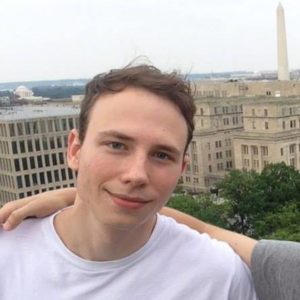
Name: Tyler Thomas
E-mail: Tyler.J.Thomas.344@nd.edu
Language: French
Location of Study: Tours, France
Program of Study: L’Institut de Touraine
Sponsors: Center for the Study of Languages and Cultures
Blog URL: http://sites.nd.edu/sla2017/author/tyler-j-thomas-344nd-edu/
A brief personal bio:
I am Tyler Thomas, a second-year graduate student in Political Science at the University of Notre Dame. I received my undergraduate degree in Political Science, Philosophy, and English from Hiram College in 2014. My academic specialties at Notre Dame are political philosophy and constitutional studies. I am from Cleveland, Ohio, and briefly worked in Washington DC before beginning my graduate studies at Notre Dame in the autumn of 2015.
Why this summer language abroad opportunity is important to me:
French language skills are vital for my dissertation. My primary research interest is the early modern break with classical and medieval political philosophy. I am interested in how the writings of the early modern philosophers established the secular world of science and liberalism that we inhabit today. I am particularly interested in the many contemporary consequences of this modern turn away from ancient political philosophy, including the uneasy question of minority religious integration into secular Western democracies and the establishment of the scientific method as the model of all knowledge.
Furthermore, much of the best contemporary scholarship in political philosophy comes from France. I am hopeful that French language skills will allow me to establish connections with French scholars and universities. Improved French language skills will allow me to engage these scholars directly and conduct research on both primary and secondary sources in the original language. Conversational French is therefore just as important an aspect of preparation for my dissertation research as reading ability.
What I hope to achieve as a result of this summer study abroad experience:
Last summer, I began my French language studies at l’Ecole Fran̤aise of Middlebury College. I spent seven weeks in the strictly immersive environment (no English permitted whatsoever) as a beginner in the French language. I learned firsthand the difference in learning a language in an immersive environment with native speakers compared to a traditional classroom. I went from a complete beginner in French to testing into the low intermediate range in less than two months.
Having already gone through one summer of immersive language training, I expect great returns on my time and effort this summer. I am enrolling in the intensive course at L’institut de Touraine, in Tours, France, and will be taking 22.5 hours of coursework per week for six weeks, for a total of 135 hours of classroom instruction. In addition, I will be living with a host family that will only speak French with me for the entirety of my time in Tours. I learned from my experience at Middlebury that complete dedication to the immersive experience pays exponential benefits. Forcing oneself to communicate at all times in a language one is still learning is frustrating, painful, and uncomfortable. Yet there is no substitute for immersive learning if one wants to make the language one’s own.
My specific learning goals for language and intercultural learning this summer:
At the end of the summer, I aim to test into the upper-intermediate or low-advanced levels in all language categories upon my return to Notre Dame. This is an aggressive goal, but one I hope to achieve with the right mixture of classroom instruction and immersive experience.
One reason I hope to make such aggressive language gains this summer is so that I may enroll in the French Advanced Grammar and Composition course at Notre Dame in the fall. This course will help me improve my French language skills to the advanced level, and will lay the groundwork for my dissertation research.
After six weeks in Tours, I will be able to engage with French scholarship directly and read the works of the seminal French philosophers in the original language, as they were composed and intended to be read.
My plan for maximizing my international language learning experience: